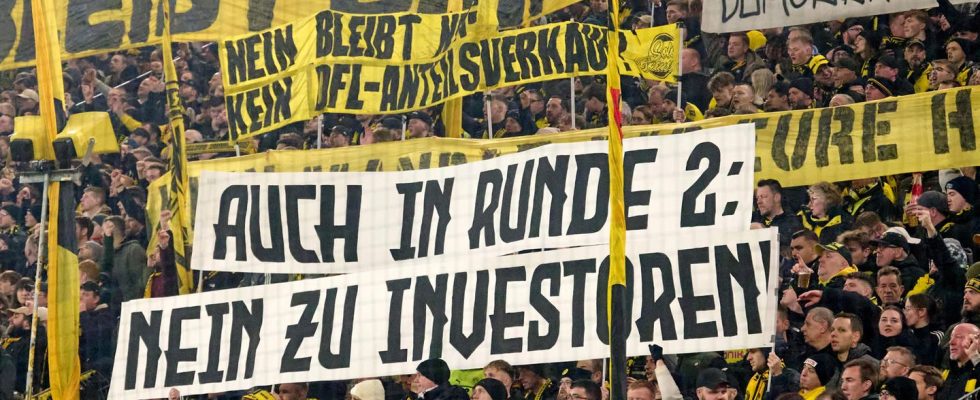Football Bundesliga
“Hopeless rat race”: This is what fans fear most about the DFL deal
In the south stand in Dortmund, people are clearly against the DFL’s investor deal and now have the worst fears
© Bernd Thissen / DPA
For many football fans it is a slap in the face: the 36 German professional clubs have narrowly voted in favor of selling part of the media rights to an investor. The most important points of criticism.
The DFL deal
The new concept is a greatly slimmed down variant of the old concept, only the core of the deal remains the same: The DFL wants to outsource all media rights to a subsidiary and sell around eight percent of the shares in this company to an investor for 800 million to one for 20 years Sell billion euros. Six bidders in the form of equity investment companies (Private equity) have expressed interest, according to the DFL.
In the event that a billion euros are actually raised, 600 million should flow directly to the DFL central administration to further develop the business model (digitization, streaming platform, etc.). 300 million will go to them Clubsin order to compensate for the initially resulting shortfall in media income. The remaining 100 million will be used to create a compensation system that rewards clubs that travel abroad for advertising purposes.
The criticism of the “TikTok” world
For the fan alliance “Our Curve,” the approval for the deal is a severe “setback”: “The DFL’s cheap words during the Corona break have finally vanished into thin air. Money is above everything,” it said in a statement was published before the vote on Monday. “The uniqueness of German football is being thrown overboard in a hopeless rat race with the Premier League.” “The consequences of this decision also exacerbate the unequal opportunities in the German leagues in favor of an increasingly artificial product of the international TikTok world.”
The biggest fear on the part of critics and fan organizations is the possible influence of the investor. What happens if the new backer wants different kick-off times and a further fragmentation of the match day in order to increase its profits? Or if the pressure on clubs increases to undertake unnecessary trips abroad? In the run-up to the vote, the DFL emphatically emphasized that the “sovereign rights” remained with the DFL and the clubs. However, the critics rightly point out that experience shows that investors always want to exert influence. After all, it’s about maximizing profits; an investor wants to make money. Sporting concerns or the interests of supporters hardly play a role.
It is also a thorn in the side of smaller clubs that the distribution key between the clubs, which is perceived as unfair, is maintained. The expected profits may increase revenues, but they also increase the gap between the big and small clubs. That was also the reason why the first deal was rejected in the spring. Because of the much higher sales price (two billion), it would have immediately put money into the clubs’ coffers, but according to the much-criticized distribution key. With the new deal, the DFL’s income is initially earmarked (see above).
Many people also have a problem with the fact that the term is 20 years. What happens if the investor resells the rights? The DFL has provided insurance here. Accordingly, the investor should only have the right to resell after eight years at the earliest. The DFL also has a veto right to prevent deals with critical partners such as Saudi Arabia or an investor group from China. A buyback of the rights by the DFL should be agreed after nine years or 15 years. Nevertheless, the possible resale represents a kind of gateway for investors who have not suffered so well.
Sources: DFL, DPA, “Southgerman newspaper“, “Picture“


